After 30 years of appliance pricing remaining the same, you now have to contend with price increases and shortages.
That is only some of the bad news.
In this article, you will learn which manufacturers are increasing their prices and how to time your purchase accordingly.
Then we will look at some problems in the appliance industry and when pricing will stabilize with promotions returning.
Manufacturer Price Increases
Below are average appliance increases for several appliance manufacturers in 2021.
| |
Percent Increase |
Date of Price Increase |
| Thermador |
2.5%-3% |
05/01/21 |
| Bosch |
2.5%-3% |
05/01/21 |
| Fisher & Paykel |
4% |
05/01/21 |
| Kalamazoo |
8%-10% |
5/15/21 |
| SKS |
3% |
5/24/21 |
| True |
5% |
06/01/21 |
| Lynx |
5% |
06/01/21 |
| Whirlpool Corp.* |
6.6% |
06/03/21 |
| LG |
4% |
6/21/21 |
| GE |
6% |
7/15/21 |
| Samsung |
6% |
7/15/21 |
| * Whirlpool includes KitchenAid and Amana as well. |
So What Do You Do?
Ostensibly, you should order before the date to avoid the price increase, or you can gamble that prices may fall when promotions return. (If you're ordering with Yale, be prepared to take delivery within 14 days once the product arrives at our warehouse).
Speaking of promotions, the predictable 10-35% off during promotional holidays all but disappeared in 2020 and Presidents' day this year.
Many people who shopped during promotions at various stores are still waiting for their products. Chances are, they will be waiting even longer.
Let's piece together when we expect "normal" to return for better prices.
Why Are Appliances Going Up in Price in 2021?
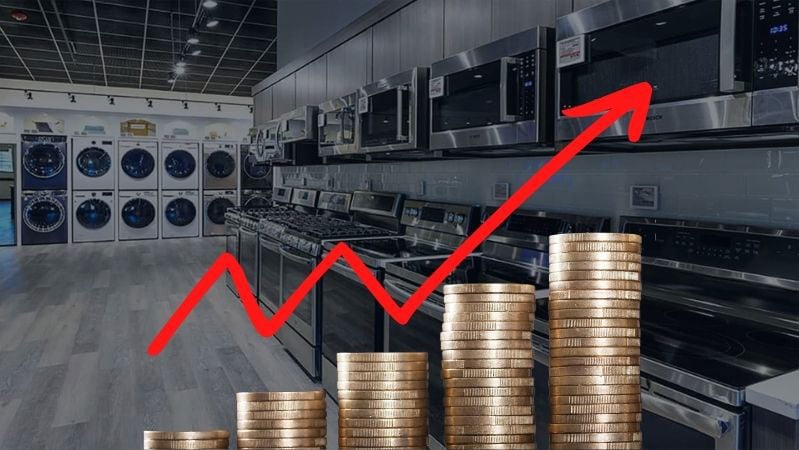
Even before I started at Yale in 1986, prices remained almost flat while being outpaced by just about every other durable and commodity.
That $399 Whirlpool washer in 1986 was $399 in 2016.
Companies had incredible amounts of competition.
For example, Whirlpool has GE, Frigidaire, Samsung, and LG competing to sell you a washer.
Simultaneously, by outsourcing parts, companies were able to maintain prices by being more efficient.
Of course, they would lose some control when outsourcing. During a supply crisis, they lose all their control.
Let's look at the challenges of producing and storing appliances during a supply crisis.
Supply Crisis Due to COVID-19
The appliance supply chain has been affected for over a year in different areas.
As I have written before, COVID-19 started in China, where many of the parts are manufactured, then made its way to the Midwest and South, where all the appliances are manufactured.
Mexico, the other parts supplier, was next, along with California with its Port of Los Angeles.
High Appliance Demand
.jpg?width=799&name=Cafe-Appliances-in-Stainless-Steel%20(1).jpg) Appliance Kitchen Set at Yale Appliance in Hanover
Appliance Kitchen Set at Yale Appliance in Hanover
In February of 2020, we had about 3,000 visitors to Yale. In April, we had 374.
We were lucky with live chat, phone, and video alternatives
For most stores, their appliance volume decreased, so manufacturers made less.
Then people started to buy more appliances starting in May 2020.
Whether stuck at home and using appliances more or plowing vacation money into their home, demand skyrocketed.
Now we have tons of demand with limited supply.
All affected factories and warehouses have to socially distance their staff, further reducing efficiency.
You can read more about COVID-19 issues by clicking here. We interviewed the CEO of Miele US, the Regional Sales Manager for Bosch, and the National Sales Director for JennAir.
Shipping Issues
 Cargo Containers
Cargo Containers
I briefly mentioned the Port of Los Angeles and its issues. Cargo containers are also in short supply.
A container's cost has increased from roughly $1,500 to 600 in less than three years, fueling some of this increase.
Raw Material Shortages
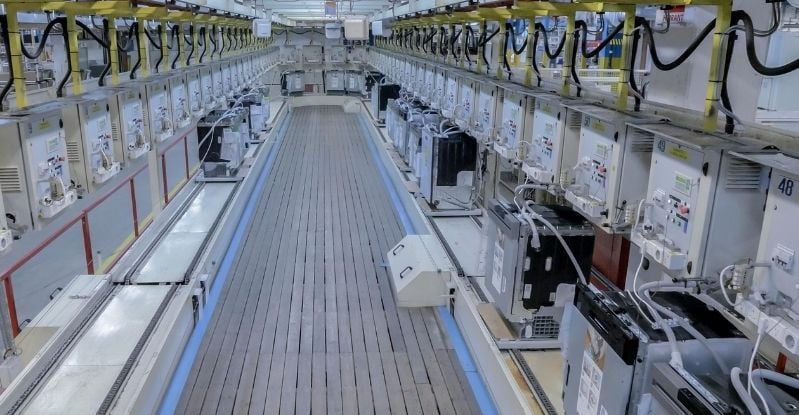 Empty Dishwasher Manufacturer
Empty Dishwasher Manufacturer
Stainless steel is in short supply as well. Manufacturers have paused many of their lower volume or less profitable products between stainless and other component shortages.
You have not been able to buy a Thermador Star Sapphire dishwasher for almost a year. Top mount refrigeration has been scarce.
Weber paused half their grill SKUs in April just as grills are becoming popular.
Computer Chip Issues
You have probably read about the chip problem in the automobile industry. Manufacturers will not produce many cars because of a worldwide shortage of computer chips.
That's why the Sony Playstation 5 (PS5) is so scarce.
Appliances need less sophisticated chips for refrigerators, microwaves, and washers.
According to Reuters, Whirlpool's chip shipments were 10% below expectations.
Lack of Refrigerator Parts
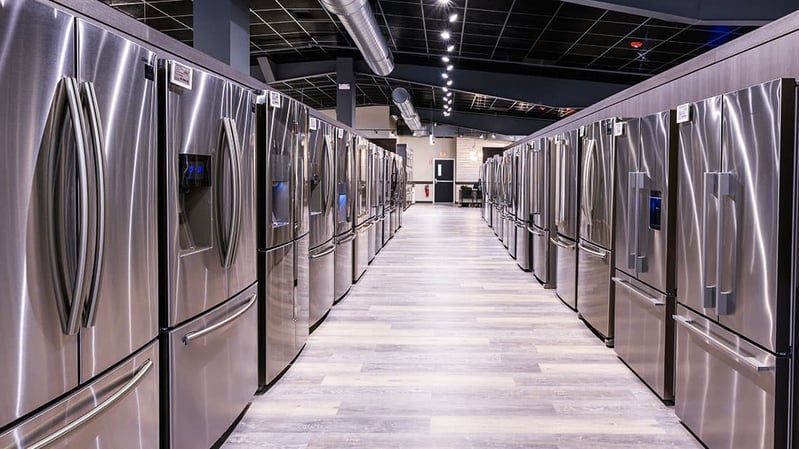 Refrigerators at Yale Appliance in Hanover
Refrigerators at Yale Appliance in Hanover
Refrigerators deserve their own special mention and will be especially problematic this year.
In addition to using the most components, chips, and stainless steel, the foam insulation in most refrigerators is outsourced to one company located in Dallas, Texas.
It was knocked out by a freak snowstorm last month.
When Will Appliances Become Available?
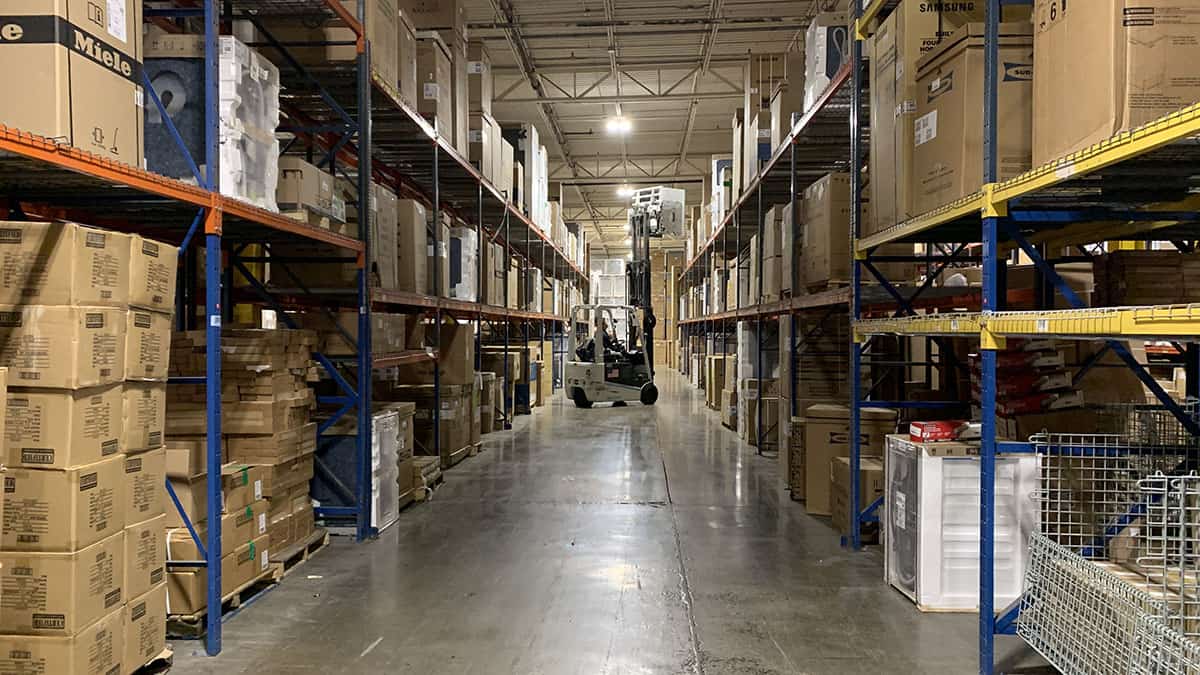 Yale Appliance Warehouse
Yale Appliance Warehouse
The answer is not anytime soon.
The appliance supply chain is not designed to recover fast.
Manufacturers and retailers became enamored of just-in-time inventory based on Toyota 30 years ago.
The idea is to reduce holding inventory and storage costs but still have enough to satisfy demand.
So appliances and parts are not stored in warehouses like they were in 1986.
It's great in practice until you have a spike in demand. Worse, if inventory of parts is lacking, then the whole process stops.
Retailers have become showrooms without inventory.
Many belong to a buying group and have almost no warehouse space to store your new appliance orders.
So even if the manufacturers could make tons of appliances, where will they go?
By the way, I am not assigning blame. This system worked until we experienced a pandemic.
We are in the process of buying a 220,000 square foot warehouse to store clients' kitchen orders.
That's two times our current warehousing capacity, and we probably need more.
When Should You Buy an Appliance?
You probably should buy now to avoid this increase or place your project on hold for late next year.
The only way out of this is a reduction of demand. When people start vacationing and traveling again, the overheated home improvement sector should normalize.
With the appliance supply chain's backlog and fragility, the return to promotions and better pricing may happen late next year or early 2023.
Additional Resources
Download the Yale Appliance Buying Guide covering all topics of appliances and lighting. Over 900,000 people have read a Yale Guide.

Related Articles:

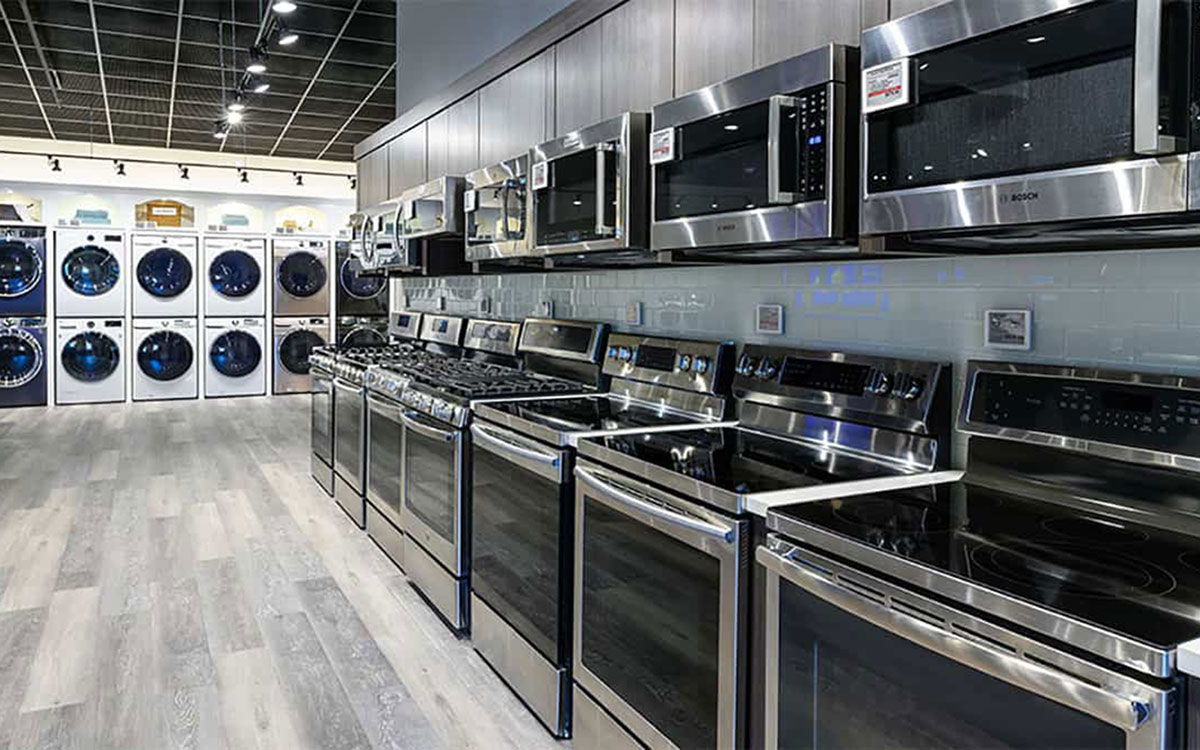

.jpg?width=799&name=Cafe-Appliances-in-Stainless-Steel%20(1).jpg) Appliance Kitchen Set at Yale Appliance in Hanover
Appliance Kitchen Set at Yale Appliance in Hanover Cargo Containers
Cargo Containers Empty Dishwasher Manufacturer
Empty Dishwasher Manufacturer Refrigerators at Yale Appliance in Hanover
Refrigerators at Yale Appliance in Hanover Yale Appliance Warehouse
Yale Appliance Warehouse 